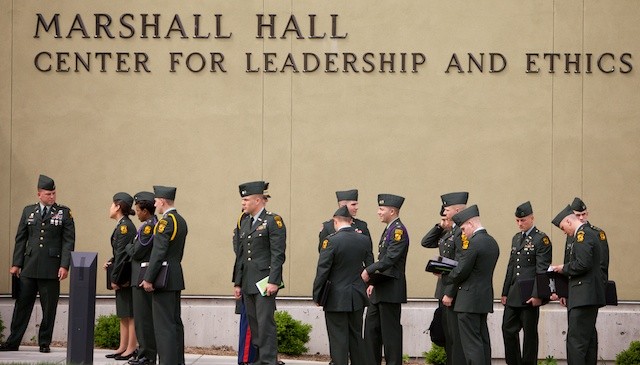LEXINGTON, Va. - Some 5,000 Army ROTC Cadets commission this school year.
Whether they rank No. 1 or No. 5,000 among the talented men and women who will pin on gold bars, only a select few - the so-called "best of the best" - earn the sort of career kickoff those attending the annual George C. Marshall Awards receive.
The leadership seminar held this week to honor the top Cadets from each of Cadet Command's 273 programs exposed them to senior leaders and practical discussions over the last two days and helped build upon the leadership foundation laid over the last four years at their home campuses.
"It's kind of surreal," University of Colorado Cadet Gale Premer said of his selection as a Marshall Award winner.
The recognition puts Cadets like Premer in select company. Over the 34 years the awards have been handed out, barely 5 percent of Cadet Command's senior students annually earn the distinction.
In all, Marshall alums total nearly 10,000.
Premer, a light infantry Soldier before pursuing a commission, had hoped he could complete his collegiate career among the top 20 percent of his graduating ROTC peers. Having exceeded that goal, he said he plans to use pieces of what he learned during the seminar to help smooth his transition back into working with Soldiers - something he awaits with much anticipation.
"I wasn't sure initially what this would be," Premer said. "To have the opportunity to speak with general officers ... you don't get that opportunity often."
The conference held on the campuses of Virginia Military Institute and neighboring Washington and Lee University centers around the leadership principals of the late George C. Marshall, a former general of the Army, secretary of state and architect of the reconstruction of Europe after World War II. Considered the epitome of a citizen Soldier, Marshall is held up as someone for Cadets to emulate.
Several award recipients admitted to a degree of nervousness as they approach commissioning and their arrival to their first unit looms. The seminar and the public confidence exhibited by a number of high-profile speakers, including the secretary and chief of staff of the Army, went a long way toward calming those anxieties.
"None of us really know what the experience will be like on that first day on the job," said Kerry Hare, of Illinois State University. "Knowing that everyone is kind at that same level of not knowing what to expect gives you confidence and comfort in that you were selected, you made it through your program, you came to this conference, you're here for a reason. Just be confident in yourself.
"That's what most of the leaders we've heard have been trying to give to us. ... 'Be confident in yourselves, and trust yourselves. The men and women who will follow you will trust you as well and have faith in you.' "
A number of general officers spoke to the Marshall winners about the dangers and obstacles they'll likely face not just early in their careers, but throughout their careers.
They'll encounter more savvy enemies. They'll encounter unconventional battlefields. They'll also encounter, as drawdowns occur in Iraq and Afghanistan, the task of figuring how to maintain a lethal fighting force as resources dwindle.
Nich Fuselier knows that overcoming such hurdles won't be easy. But the Cadet from Texas A&M University-Corpus Christi expressed optimism about the mission his generation of leaders will accomplish.
"I'm looking forward to going and standing up to meet these challenges," Fuselier said. "It should be a fun time, especially being in such a changing Army and a changing environment. My class has a lot of stuff to get done, and I think we're more than capable of getting it done."
Besides the chance to listen to proven leaders share their experiences and attend roundtables where they could dialogue with Soldiers who have demonstrated their ability to achieve professional and personal success, many Cadets found the opportunity to renew friendships with soon-to-be lieutenants they had met previously at military schools and the Leader Development and Assessment Course as invaluable.
Some spent time catching up. Others spent time trading ideas on how they'll approach life as a commissioned leader.
"This is a chance to get to know other people in the same position you are," said Premer, who anticipates interacting with some fellow Marshall winners throughout his career. "You never know what will come from it."
As they now eye their graduations and commissioning, many Marshall Cadets eagerly anticipate the greater challenge that waits.
"You're going to be charged with 30 or so men and woman underneath you who have experience and have been in this lifestyle for years, and you're going to be expected to take care of them and be accountable for them," Hare said. "That's a huge undertaking. I'm going into this at 22 years old. In the outside world, that's fairly young.
"To have that much responsibility for so many other people, it's very intimidating. But even with that you have to go into it with the confidence of knowing there's a reason why you're doing it."


Social Sharing